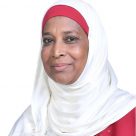
Aminath Athifa
Minister of Housing and Urban Development
Urbanism / Maldives
“We are creating a new state company focused on social housing development”
Years of rural exodus towards the capital city of Malé has turned the housing market in the small capital island into a crowded, prohibitively expensive place to live in. Now, with a new economic and social decentralization plan, the government, via the ministry of housing and urban development, is trying to reverse the trend, while simultaneously promoting social housing as a way to alleviate the struggles of the most vulnerable parts of the population.
What is the main focus of your ministry today?
As the ministry of housing, we have responsibility over the well-being of all Maldivians. We have been very vocal regarding the necessary changes to the housing sector in the Maldives, especially concerning the influx of people towards Malé. The situation in the capital has become unacceptable and it affects many Maldivians. The capital currently hosts nearly half of the country’s population, with no place to expand, which means that housing prices have skyrocketed and living conditions have degraded. Today, Malé is one of the densest urban areas in the world.
Our focus is on reconditioning the capital by finding ways for people to move out of the city into other urban centers. For this to happen, we need to provide health and education services, and work opportunities in other regional centers. At the same time, we need to provide the most vulnerable social groups with affordable housing so they can have a decent standard of living.
How are you going to accomplish these goals?
The government has an overarching decentralization program that will align efforts from most ministries, including education, health, transport etc. Within the housing ministry, we are creating a new state company focused on social housing development. It will be launched in the second quarter of 2019. The new corporation will not only focus on Malé and the undergoing affordable housing developments in Hulhumale, but across the whole of Maldives.
It will be partially financed by the State and partly by multiple financing institutions with which we are currently negotiating. Once established, the Social Housing Development Corporation will have all the tools to greatly alleviate the need for affordable housing, under a strict management structure directed at developing these houses in a cost-effective and manageable way. We already have planned 4,000 new units for social purposes in the greater Malé area. The next step is to design strict eligibility criteria to make sure they are allocated to those that need them the most.
What can be done to improve the rental market?
The rental market is a concern, as rents have risen considerably in the Malé region in recent years. However, our concern is not the price of rent, but the quality of life of the people. We cannot and we do not wish to control rent. We wish to enable the proper tenancy, providing security, accessibility and a habitable environment. For that, we are establishing a new legislative framework that will establish the responsibilities of the proprietors to provide basic services in order to be able to rent spaces. We can no longer accept that someone is paying rent for a place that has neither water or electricity.
Furthermore, we would like to create a better environment for the housing sector across the Maldives. This enabling environment entails physical development of houses as well as social support for the people involved, especially focusing on families in poverty.
